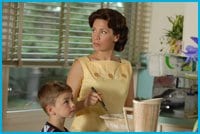Swiss-born, Quebec- based Léa Pool cemented her place in the world cinema pantheon with her astounding 1998 film Emporte-Moi (Set Me Free), a riveting story of urban 1960s teenage girlhood and an impassioned homage to Nana, the prostitute heroine of Jean-Luc Godard’s canonical film Vivre sa Vie. Pool’s career is a bit uneven but always worth paying attention to, and her latest film, Maman est Chez le Coiffeur (Mommy Is at the Hairdresser’s), is no exception. While treading well-worn territory — namely the unspoken transgressions and traumas that trouble the placid waters of idyllic small-town life — it still contains plenty of colour and charm. In other words, while the characters’ destinations are no surprise, you’ll enjoy the ride.
Returning to the theme of ’60s girlhood, the film takes place over one summer vacation in a small Quebec town. The Vietnam War is discussed on the radio, a million miles away. Siblings Élise (Marianne Fortier), Coco (Élie Dupuis) and Benoit (Hugo St-Onge-Paquin) seem to live an ideal life, basking in the warm glow of their feisty and whip-smart mother, Simone (Céline Bonnier), a Radio-Canada TV journalist. While the summer should be a time of youthful exuberance — running around in the sun, awkward sexual hijinks — the kids’ lives spin into chaos when mom discovers that dad (square-jawed Laurent Lucas) has been having an affair. In a frenzy of grief she requests a transfer to London, promising that the children will join her eventually. “Mommy is at the hairdresser’s” is what the siblings answer in unison when asked where their absent mother is. It is a white lie, an excuse to keep up appearances and not let the nosy neighbours in on the family’s private distress.
Dad’s extramarital affair is with one of his golf buddies, briefly glimpsed only once at the beginning when they drive up to the house looking all crisp, clean and pleased as punch with themselves. Dad is a hunky microbiologist — a man who can save the third world from tropical diseases and always has a tidy, stupid proverb at the ready but can’t grasp why his wife left. And while we can’t abide his cluelessness, we do empathize greatly with his sudden single fatherhood.
Most surprising and satisfying in the film is its keen observations of childhood. It captures all the communication gaps and misunderstandings between parents and children that leave kids with no idea what is going on. All the child actors pull off the strangeness and awkwardness of youth remarkably well. The film is only occasionally mawkish — a neighbouring boy who believes himself to be an Austrian prince and other forcedly “quirky” locals tend to ring false.
The youngest child, Benoit, a pant-wetter, is unforgettable. His constant asking “What’s that?” and “What’s this?” has led his know-it-all father to believe he is retarded, and he knows it. Despite his youth, his pain is staggering.
This family’s crisis — and those we glimpse in other nicely kept homes and yards in the neighbourhood — produces many dark moments, but Pool’s lucid, beautifully shot and lovingly designed film renders them with the same bright palette as the scenes that make this world initially seem like such a paradise.


 Why you can trust Xtra
Why you can trust Xtra


